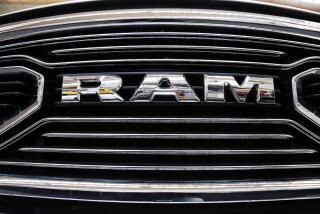Verdict in Ford Suit Is Sweet for ‘Lemon’ Law Advocates
- Share via
A $10-million jury verdict against Ford Motor Co. for reselling a defective vehicle to an unwitting Fresno County couple is being heralded by consumer advocates as an important victory in the effort to compel auto makers to comply with California’s “lemon” law.
A Fresno County Superior Court jury last week ordered the auto maker to pay Greg and Jo Ann Johnson of Clovis $17,811 in compensatory damages and $10 million in punitive damages-reportedly the highest in a civil case alleging so-called lemon laundering.
The jury, in its verdict delivered Dec. 17, said Ford had violated state law and committed fraud by taking back defective, or “lemon,” vehicles from customers and reselling them without disclosing their troubled histories to the next buyers.
Ford, through a spokeswoman, defended its buyback practices and said it is considering filing an appeal.
When the Johnsons bought a used 1997 Taurus in 1998 from Decker Ford in Fresno, they were not informed about the automobile’s checkered history, said Fresno attorney William M. Krieg, who represented the couple.
From the beginning, Krieg said, the car was plagued by transmission problems. When the original owner asked that the vehicle be declared a “lemon,” Ford declined to buy it back or replace it.
Under California’s lemon law, auto makers have four attempts to fix non-life-threatening defects and two attempts to repair life-threatening defects on a vehicle before it must officially be branded a lemon, requiring the manufacturer to replace it or buy it back.
Instead, Ford offered to take back the Taurus as a trade-in of sorts and issue an “owner-appreciation certificate,” or OAC, for $1,500 toward the purchase of a new vehicle.
The original owner accepted the offer, Krieg said, and “by the time the dust was settled on that transaction, it looked just like a regular trade-in.”
A manager at the dealership drove the Taurus for a while and then it went back out on the lot, without having been repaired, the Johnsons’ suit alleged.
Within a year and a half of their buying it, and with only 20,000 miles on the odometer, the Johnsons said, they had to replace the transmission twice.
It wasn’t until he asked to see the Taurus’ complete service records, Greg Johnson said, that he discovered the problems the previous owner had encountered. “I was angry and surprised,” he said.
As with the original owner, Ford declined to buy back the vehicle as a lemon. The dispute went to arbitration, and it was recommended that instead of declaring it a lemon, the dealership extend the service agreement by 36 months or 36,000 miles.
But Johnson, 49, a sergeant with the Fresno County Sheriff’s Department, decided to fight back.
“I’ve been a law enforcement officer for 26 years. I believe in doing the right thing for the community and public.... I’ve always cherished these beliefs,” he said. “So when it became very apparent that this was not just an individual case--that it was an issue of Ford’s practices and what they were doing to the public--it became clear to me there was only one course of action.”
He and his wife sued Ford and the Fresno dealership. The dealership settled out of court for $100,000, Krieg said; Ford originally offered to settle for $50,000.
Despite the jury’s verdict, Ford said it has no intention of ending its customer buyback program and is considering whether to appeal, spokeswoman Kristin Kinley said.
“It’s a good program when it is used for the purpose it is supposed to be used for,” she said.
Describing the Fresno case as an isolated incident in which the previous repair history had not been disclosed to the Johnsons, Kinley said “we do have things in place to prevent this from happening.”
“Ford strongly believes in adhering to laws governing vehicle buybacks and does not use OACs for any purpose other than to generate goodwill.... The certificates are used to enhance customer loyalty of high-value customers,” she said.
California has one of the toughest lemon laws in the country. Yet some motorists continue to have difficulty persuading manufacturers and dealers to replace or buy back faulty vehicles, despite recent revisions meant to close loopholes in the law, said Rosemary Shahan, president of Consumers for Auto Reliability and Safety.
Ford nationally has issued about 10,000 owner-appreciation certificates a year for the last few years, said Krieg, who obtained Ford statistics and policy details during the discovery phase of the Johnsons’ case. In California, about 1,300 certificates are issued each year.
“Each one of those certificates issued represents a vehicle in which the owner claimed it was a lemon and asked for it to be bought back but received a certificate instead,” Krieg said. The average certificate value is about $3,200, but the amount can go as high as $5,000, he said.
Krieg argued at trial that by avoiding lemon-law buybacks and reselling the cars or trucks, Ford saved $6,000 to $10,000 a vehicle.
Ford’s OAC program is just a way to “trade the vehicle in under the radar screen” and save money, said Shahan, whose Sacramento-based advocacy group was a sponsor of the revised California lemon law.
Jeanne Wright cannot answer mail personally but responds in this column to automotive questions of general interest. Write to Your Wheels, Business Section, Los Angeles Times, 202 W. 1st St., Los Angeles, CA 90012. E-mail: jeanrite @aol.com.
More to Read
Inside the business of entertainment
The Wide Shot brings you news, analysis and insights on everything from streaming wars to production — and what it all means for the future.
You may occasionally receive promotional content from the Los Angeles Times.










